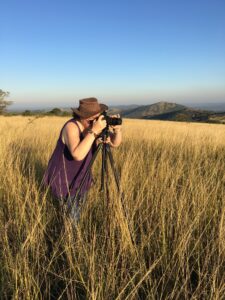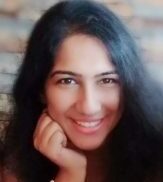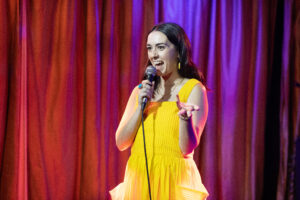Mira Zaki’s journey is a testament to the transformative power of passion and identity. From her childhood fascination with a Polaroid camera to her profound exploration of cultural roots through the lens, Mira has turned her love for photography into a powerful medium of self-expression and storytelling. Her latest project, which delves into the intersection of identity and food, highlights her unique perspective as an Egyptian-American and showcases how deeply personal experiences can shape and inspire creative work. In this interview, Mira shares the inspiring story behind her project, the challenges and triumphs along the way, and the invaluable lessons she has learned about vulnerability, identity, and the art of connection. Dive in to discover how Mira’s vision continues to evolve and resonate with audiences on a deeply personal level.
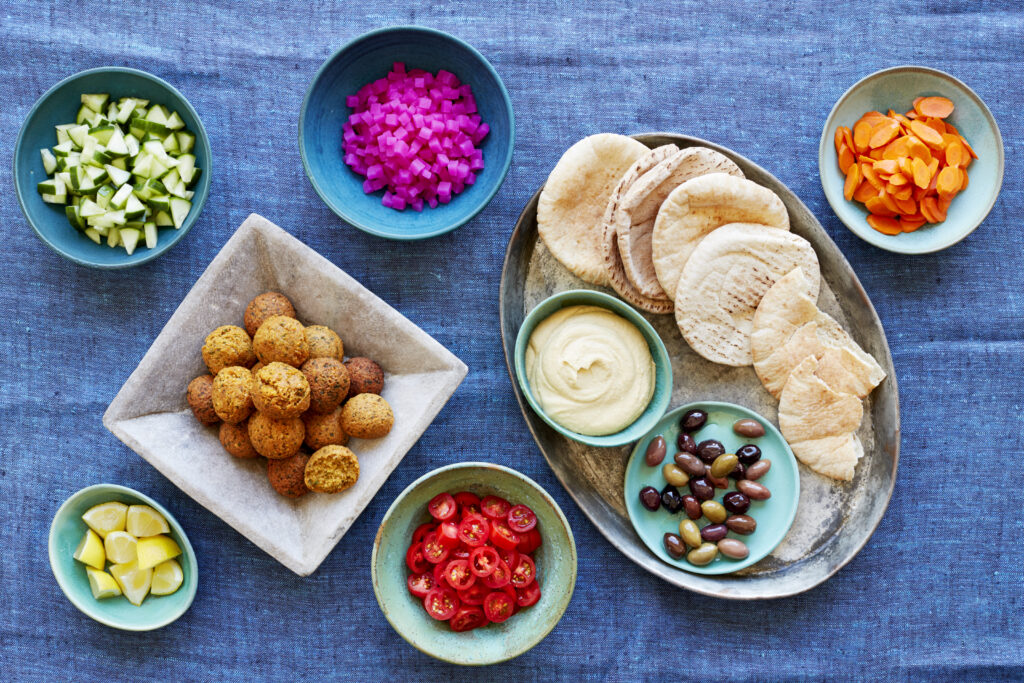
1. Can you share more about your journey into photography and what drew you to it?
My journey into photography started when I was 8 years old and picked up my family’s Polaroid camera- I remember taking a photo and instantly falling in love. I used the whole pack of Polaroids in just a few minutes, and immediately wanted another one which was quite expensive at the time. The Polaroid sparked my love for visual storytelling and helped me develop my skills capturing my environment and how I saw the world. I was always a very observant person naturally, so photography just made sense to me! From that moment, I signed up for every photography class in school and even went to photography college and got a B.A. in Commercial/Advertising Photography. I was drawn to the powerful way that photography let me express myself without saying a word.
2. What inspired you to create your project on discovering identity through food?
I was one of the photographers for the James Beard Foundation, and when I asked them if I could be one of their featured artists in their in house Greenhouse Gallery Exhibit- I didn’t expect them to say yes immediately. I had to get to work and create a project! I was very lucky that one of my closest friends is an award winning art director and helped me choose my theme for this new project- he talked me through it on the phone in less than 10 minutes- he asked me a series of questions quickly that easily led me to the theme of Discovering Identity through Food since I am an American born to Egyptian parents. It truly would have taken me a lifetime to decide without him- I am so grateful! He also was my art director for the entire project!
3. How has your Egyptian-American heritage influenced your work and your approach to this project?
Since I was not born in Egypt and do not speak Arabic, my only real connection to the culture was the food. My mom cooks everyday, and food is our favorite family topic. I didn’t expect to dive so deep into my feelings about my cultural identity, and the project actually continues on today! Having this cultural heritage influences my work because your life and perception are different when you are a child of immigrants, and on my photoshoot sets- I always say that my photoshoots are like inviting you to dinner at my house- you will be well taken care of and fawned over as is the cultural norm for Egyptian families- guests are very revered! I can’t help myself, I really don’t know another way and I love connecting with people in this way.
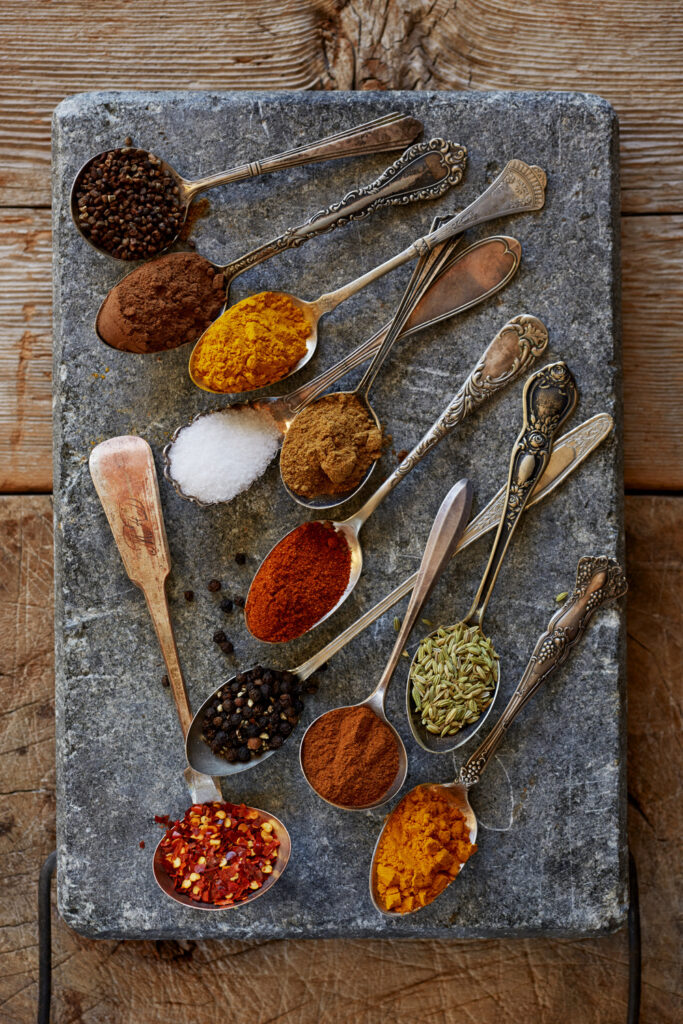
4. Can you tell us about the process of creating your photo exhibition and how it evolved into a memoir?
The memoir part was unexpected- I honestly thought I would just create this themed project for the exhibition and not think about it again. In the process of creating the project, I was diving deep into many unexpected themes and processes- of meals, recipes, coming together with family and community, memories from growing up in Seattle, food shopping, making a meal from start to finish, asking my mom a million questions about these meals, recipes, and preparation, it was a literal journey to create this. I was not expecting that! Thanks again to my friend Mark- he was the one to suggest that this project had a lot more life in it, I think it might continue to evolve since it has a strong relatable theme at its core. When I knew there was more to discover, I worked with my favorite book coach and she instantly understood my vision and helped me outline my entire memoir! I still have to sit down and write it, though, haha!
5. What were some of the most meaningful moments during your time photographing for the James Beard Foundation?
It was such an honor to work with the most prestigious name in the food industry, I honestly have the greatest memories of my time there! The staff were all so welcoming and kind- I am still in touch with them today. Simply being in James Beard’s actual home regularly I got to experience hundreds of chefs unique cuisine, watch and document them preparing the multi-course meals and I was fortunate enough to have eaten them, too. I made a lot of friends- food people are my people, and I was grateful to photograph many of their events as well including Chefs & Champagne. I am a curious person who loves to learn- so I learned a lot watching these incredible people. My exhibition was a memory I will remember forever- I had so many people RSVP we were on the verge of being a fire hazard! The night was full of people coming and going- the catering understood the assignment and recreated some of my favorite Egyptian food appetizers for the guests. A photo exhibit always makes me feel like a rockstar- it is such a special time to share and connect with others, and I left with so many flowers I felt like I had just graduated school. Food will always be my first love language- there’s nothing that connects people more!
6. How did exploring your identity through this project impact your personal life and relationships?
I am still exploring! As the youngest in my family and a deep thinker who is an empath, this was therapy in a way that helped me understand I am not alone in this feeling- there are so many people with multicultural backgrounds who also might experience cultural identity crises like I have most of my life and didn’t know how to give language to it. I feel more connected and empowered to talk about this and share even more with people personally and professionally. This project continues to open up doors to meaningful conversations. I also am grateful to not feel like such a weirdo or embarrassed by Egyptian food- I wish I could hug my younger self and tell her that one day everyone would love and eat the food you grew up eating- this was a way of actually doing that in the end.
7. What were the biggest challenges you faced while working on this project, both creatively and emotionally?
Creativity and emotions are where I live all the time- so the challenges were many. I wasn’t expecting to feel the range of emotions I felt as this was developing- I thought we would just recipe test, do our pre-production and be done shortly after shooting. It was so personal, it felt like I was in therapy everyday (not in a bad way either). This project actually took exactly one year from the idea and acceptance into the gallery until the actual exhibition show, so there were a multitude of emotions over that time. I ended up with an amazing crew and location to shoot which helped support the project even more- but it took a lot of planning, back up planning, and production as all photoshoots do- this one meant more because it was a personal project and while there was a deadline- it was very far away. It can be challenging to produce your own photoshoot, but I am pleased with my production skills. Creatively, I remember just having to let one shot go, it just didn’t look right and I was disappointed but had to move on to have time for the others. Sometimes it is difficult when things do not match your vision, and letting go is essential.
8. How did you navigate the vulnerability of diving deep into your identity and sharing it with others?
I am a very sensitive person- vulnerability is foundational to all of the work I do. I think over time it gets easier to share it, otherwise it can feel like a burden is released because carrying it and feeling alone is a lot heavier. People relating helped tremendously, or people just being moved by the project provided a lot of support and I felt less vulnerable as a result of that. Additionally, I was so proud of how it turned out after having worked so hard on it self funding and self producing, I really wanted to share the photos and the journey.
9. How has this project helped you grow personally and professionally?
Something magical happens when you share something that you carry deep within you- you are freed up of space, energy, emotions and it gives you the freedom to allow something else to come in, or simply to exist with more space in your mind and body. Even though this project is 10 years old, it still stands up today- and one of my photos of spices on spoons is still my best-selling print today. I think this gave me a personal way of being credible in my field- it set a standard for my work and projects, and I am still exploring my cultural identity today with more compassion and wisdom than I had 10+ years ago.
10. What role does mental health play in your creative process, especially when dealing with themes like identity and culture?
Mental health is critical for everyone, but especially for a creative. It was certainly a roller coaster of emotions for me, and I had to make sure that I honored my feelings as they came up- whether I needed to give language to something I’ve felt all my life, to grieve and cry, or at times laugh and be excessively joyful about the power behind this project. I made sure that I had people to talk to during this process I am happy to have a great support system in place.
11. How do you balance the emotional weight of your work with maintaining your mental well-being?
I love the deep questions! I honor the range of my emotions, I welcome them and let them exist- thankfully over time I have learned when to release some of them, and when to sit with some of them a bit longer.
12. What advice would you give to other women who are exploring their own identities or embarking on personal creative projects?
Great question! Have a support system in place! It was essential that I had people to talk to, people who would deeply listen because identity is foundational to who we are at our core and exploring it is more vulnerable than you might initially think. It’s also important to have outlets for the feelings that come up- whether that means deeply nourishing yourself with good food, or using tools and practices to help process your emotions. I love to sing in the shower or dance around my living room to my favorite playlists. It’s also critical to surround yourself with fellow creatives- we understand each other’s language.
13. How do you stay motivated and inspired when working on long-term, deeply personal projects?
I had a clear vision of the end goal in mind- and I worked towards it. I was thrilled that it exceeded all of my expectations when I finally got to my shoot day, framing the photos day, and exhibition day! I was someone who loved school and got all A’s- I think that helped me stay motivated when things got tough or had to be reconfigured. I also live my professional life by deadlines, so that worked well for the planning part of my brain.
14. Can you share any tips for other creatives on how to approach cultural heritage in their work?
Absolutely! Talk to everyone you can- you never know what kind of connections you will make, or what it can uncover for you in the process- especially if your story is similar to mine. If there’s an opportunity to travel to the places that are your heritage, that is also a goldmine! I think it’s important to document as much as you can as well, my initial storyboard of the project was almost nothing like the final product, and it’s easy to refer to pictures and notes so you don’t lose anything.
15. What’s next for you and your project? How do you envision it evolving in the future?
I am working on both the memoir and a part 2 of the photo part of the project which I will share more of when the time is right. When the memoir is complete- I’d love to have a book tour and some type of food related event- I love eating with people! A lot of friends and colleagues have told me I should have a podcast- I might consider it!
Threads: @mirazakiphoto
W: www.mirazaki.com

